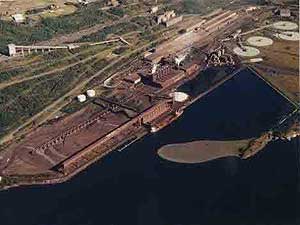|
Photos
More from MPR
|
February 23, 2005
Retired federal judge Miles Lord is asking Gov. Tim Pawlenty and the Legislature to put a moratorium on new taconite projects on the Iron Range, until questions are answered about health concerns. In 1974, Lord issued a landmark ruling that forced Reserve Mining Company to stop dumping its waste rock into Lake Superior. Scientists had found asbestos-like fibers in the rock. Now Lord says the state hasn't done enough to find out whether those fibers are making miners sick.
Duluth, Minn. — The Reserve case ended in the early 1980s, with strict limitations on mining companies on the eastern end of the Iron Range, where the Reserve taconite mine was located. For instance, the company that owns the mine now can't sell its waste rock as aggregate for roadbuilding, because of concern that the asbestos-like fibers in the rock could cause cancer.
But Miles Lord says he doesn't trust the rock from the western end of the Range either. He says no one has proven it's safe.
"They completely ignored -- and assumed that they're safe, without any evidence to that effect," Lord says.
Mining companies want to find a use for their waste rock, and Twin Cities area roadbuilders need a new source of aggregate. Lord says the state should stop using the taconite aggregate in road tests, until it's studied more thoroughly.
State Rep. Tom Rukavina, DFL-Virginia, disagrees. He says the state highway department wouldn't be testing hazardous materials.
"Miles Lord is a great guy. I like him a lot. But I think on a lot of these issues he's stuck in a time warp, dealing with the huge case he dealt with as a federal judge on Reserve," says Rukavina. "What's being proposed in northeastern Minnesota today is not what the Reserve Mining Company case was all about, and I don't think any parallels can be really drawn to that."
Taconite aggregate isn't Miles Lord's only concern. He also wants to stop plans to build an iron nugget plant on the Range because of the possible risk posed by the fibers.
The Minnesota Health Department says northeastern Minnesota has nearly twice the rate of mesothelioma as the rest of the state. That's a very rare form of cancer that's only known to be caused by asbestos.
The Health Department says most of the miners who got mesothelioma were exposed to commercial asbestos as well as to taconite dust. For many years, asbestos was used in insulation around boilers and pipes.
But David Trach of SOAR, Steelworkers Organization of Active Retirees, thinks it's just as likely that miners get mesothelioma from taconite dust. He says his group screened about 500 former mine workers with x-rays, and 30 percent of them had lung abnormalities.
"And I'm talking (problems) that range from mesothelioma to pleural plaque to cancer," Trach says. "But they're showing up with some kinds of abnormalities, they call it, from the asbestos. And there's a lot of people that didn't get tested, either."
Trach wants the Health Department to look into it more thoroughly. So does Judge Lord. He says the department is sitting on enough data to get some clearer answers. Lord says the department has a list of people with cancer across the state, and a list of 72,000 iron miners.
"Take the list of people who got cancer, run it against the list of iron miners, and you're going to find a lot of iron miners there with cancer," Lord says. "And that alone is a pretty good start to a real epidemiological study."
The Health Department proposed a similar study, but the Legislature cut the money for that research. Rep. Tom Rukavina says he'd be in favor of funding more research.
"But so far there's been money expended on this that hasn't proven one way or the other that there's a health hazard to the people that are employed in the mining industry," Rukavina says. "And there's health hazards in all kinds of industries."
Two years ago the Health Department said it would wait for the results of a scientific symposium on health concerns about rock fibers, before deciding whether to conduct a risk assessment on the fibers in taconite.
The report from the symposium was supposed to be published a year ago; now the organizer says it might be ready by fall.
The governor's office says it values Lord's input and is passing the letter along to the Minnesota Department of Health for further review.





